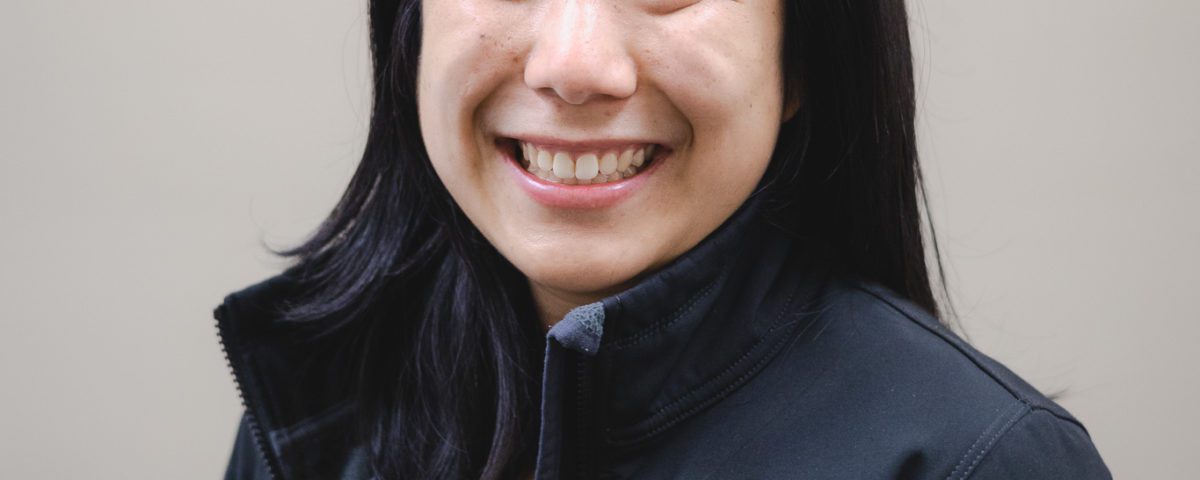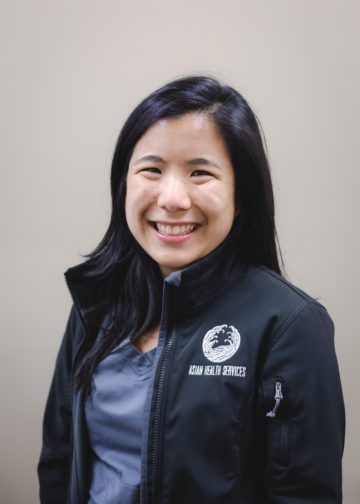
Staff Highlight
Shirley Ma, COVID Team
AHS is incredibly proud of our frontline essential workers who have been there for our community since day one of the pandemic.
"Asian Health Services has conducted nearly 65,000 tests and 35,000 vaccinations at our clinic sites in Chinatown as well as at our many pop-up clinics in the local parks, schools, and community centers. All in-language and accessible to our diverse communities. Thanks to our amazing COVID frontline heroes.”
Thu Quach, PhD, Incoming President

We recently had a chance to chat with one of our COVID team members and longtime AHS staff, Shirley Ma. In our interview, Shirley discusses the most rewarding and challenging aspects of her roles, her most memorable patient interaction, and future plans.
Interview edited for length and clarity.
Can you talk about your role with Asian Health Services (AHS) and how long you’ve been here?
I started at AHS as a labor coach volunteer when I was an [undergraduate] student at UC Berkeley in 2011. As a labor coach, I would go to the hospital and be an interpreter and doula for monolingual Chinese speaking mothers in labor and delivery. I joined AHS in 2015 as a Comprehensive Prenatal Healthcare Worker (CPHW). I did a lot of prenatal education for pregnant mothers and education around their pregnancy, some soft social work things like figuring out where they wanted to deliver, signing them up for WIC [The Special Supplemental Nutrition Program for Women, Infants, and Children] and other community resources. I did that until 2017, when I then left to go to UCSF to become a Women’s Health Nurse Practitioner and Midwife. I didn’t know about nurse practitioners or the field of nursing until I came to AHS and got introduced to the various professions here. And I really liked prenatal care, so it seemed like the most natural route for my career
While I was at UCSF, someone from AHS reached out and asked if I would like to join the COVID team. I was a nurse at that time, so I came back to work for COVID testing and vaccinating.
How did you first hear about AHS and once you were here, what made you keep coming back?
I grew up in Oakland, so I’ve always known about AHS and seen them around. When I was a labor coach, the supervisor reached out to me about the CPHW job opening. So it just that the right opportunity came at the right time. And it been really nice! Because I really like being able to work with people in our community and practice my Chinese…it just feels very homey.
My friend and I who work together—we keep on calling AHS “the village.” Like a little community village, you’ll always come back.
For the work you do, what would you say is the most rewarding, and on the flip side, the most challenging or frustrating part(s)?
I can go through all three jobs…[laughs] So for labor coach, and definitely when I was a prenatal healthcare worker, I really love working with pregnant people and helping people start their families and being excited for them for this next chapter of their life, so that’s why I chose the profession of a midwife—that’s just a very… it just draws me in, that scope of care.
The COVID team was a little bit more of means to pay for school. But the team is super fun—I’ve really enjoyed everyone I’ve swabbed with and vaccinate with. Especially during the time of the pandemic, when it’s very isolating, working at AHS and being able to see some people in person, even though it’s the frontlines, it just helped with coping with the pandemic a little bit better.
Frustrating wise, I think just—and it’s not on AHS—it’s just the general pandemic has been challenging and the demand of testing and vaccinating can be very busy sometimes. So I would say that’s one of the challenges. In prenatal care, especially when working with a mostly Medical population, there’s not enough… sometimes hard to get the resources for the right people at the right time, like housing, or food, or figuring out insurance And also language accessibility for a lot of people—we can give all the services in-language to people while they’re here, but once you refer someone outside, they may not necessarily be able to serve people in their language and meet their cultural needs.
That’s so true, the whole system needs to be set up…
Definitely, definitely. And navigating the system is really hard. For the immigrant population, navigating insurance or all of the things that involve having a new child, like birth certificates, going to school, how to choose a pediatrician… without someone to guide them, it can be very hard.
When I was a prenatal healthcare worker, we did a lot of healthcare navigation work. We work as a team. Social work can help with this like connecting to community resources, housing, or mental health needs etc.; front desk does a lot of insurance navigation; and I did the pregnancy related things.
Of the patients you’ve helped, are you able to share any memorable interactions that you’ve had throughout your time at AHS?
My very first patient was when I was an undergrad. She was having her first baby and this was also the first time I was witnessing a delivery, and I was shadowing a more senior labor coach. And [the patient] pushed for hours… I didn’t realize deliveries were not like the movies, where you push and the baby comes out [quickly]. [In real life] it’s like hours, sometimes a day or two. And she was just really tired and kind of struggling, and I saw my senior coach coach her through all of it. Later [the patient] invited me to her baby’s hundred day baby shower… the red egg thing, and when I walked in, I didn’t recognize her because when people are in labor and delivery they’re all sweaty and in a gown. But then she was all dressed up and she said, “It’s me Shirley!” and I was like, “Oh you look amazing!”
And then when I graduated and started working at AHS as a prenatal healthcare worker, she became my patient again! Because she was pregnant with her second child. So it was really cool to have that continuity. She remembered me and showed me pictures of her kid. It was just nice having appointments with her. With a lot of patients, you become very close, especially when you have multiple visits with them when they have multiple children.
What is something that AHS does that you think people should be more aware of, or any last thoughts you’d like to share?
I think definitely AHS fills a niche gap in the Asian immigrant community, especially with the monolingual, Medical, more low-income people. As I mentioned, navigating things are really, really difficult when you don’t speak English or when you don’t know how. And a lot of team members, with multiple language skills, often work together to fill in that gap to help people figure out their livelihood here. And it’s all a very small community clinic that serves the larger Asian community here, but it all feels very homey and cozy.
On future plans…
I’ll be starting a job as a full scope midwife in Portland in late February 2022.
